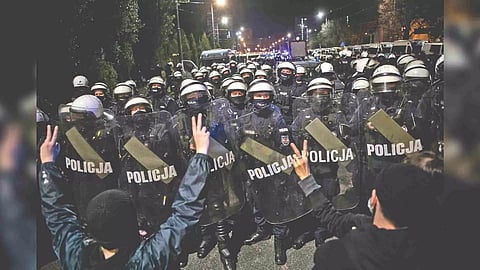

J Kuisz and K Wigura
The war in Ukraine has thrown up many paradoxes. One of the most peculiar is that Vladimir Putin’s invasion made autocratic politicians in neighboring countries look, all of a sudden, like the good guys. Nowhere was this more the case than in Poland. As the war shifted the global geopolitical focus to Eastern and Central Europe, Warsaw revelled in the attention. Previously reluctant to accept refugees, the country took in millions of Ukrainian women and children, opening its arms in an impressive display of solidarity. As Poland began to play an important role in Ukraine’s defense — giving major aid to Kyiv, including over 2 billion euros’ worth of military equipment — observers in the West seemed to believe that something fundamental had changed in the country.
If only. Poland’s support for Ukraine is no sign that now, after nearly a decade of democratic backsliding, it’s coming around to the importance of democracy. What the government is defending, really, is sovereignty and the right to self-determination — an existential rather than a political commitment. In the rush to acclaim Poland and present a united front, Western politicians have overlooked something at their cost. Far from receding, Polish illiberalism is alive and well.
We know, by now, what that looks like. The government, led by the hard-right Law and Justice party since 2015, has taken over key state institutions such as the public media, curtailed the independence of the judiciary and instituted draconian abortion laws. To neutralize opponents, almost all political tricks are allowed: wire-tapping, denigration and even outright lies. With crucial parliamentary elections coming this autumn, the electoral process has been tinkered with to favor the incumbents and a new bill passed that could remove opponents from political life on the pretext of acting under Russian influence. In its bid to secure a third term, the Law and Justice party is leaving nothing to chance.
The party’s success has been built on targeted social transfers, genuflection to the country’s Catholic identity and avowed nationalism. But it also owes a lot to skillfully played campaigns of collective fear and demonisation. For much of the party’s eight years in office, migrants, women and sexual minorities have been the chief targets. The government also regularly attacks the opposition, often in luridly conspiratorial terms. Its ministers and supporters suggest, for example, that the leader of the opposition and a former prime minister, Donald Tusk, plotted the plane crash that killed the Polish president in 2010. However outlandish, such conspiracy theories play into — and amplify — a pervasive fear that things are changing rapidly for the worse.
That fear is what undergirds the country’s response to the war. Poland’s modern history — annexed, subordinated and occupied — is one of a recurrent loss of independence. This tragic inheritance, never far away, explains the government’s energetic response to the war in Ukraine: The future must not repeat the past. And it’s not just Poland. A glance at the map is enough to see that the countries most muscular in their defense of Ukraine are those affected by the 1939 Nazi-Soviet pact, which exposed Finland, the Baltic States and Romania, along with Poland, to the depredations of conquering armies. Theirs is a solidarity based on the trauma of Russian imperialism.
Kuisz is the editor in chief of the Polish weekly Kultura Liberalna, while Wigura is a board member of the KL Foundation in Warsaw